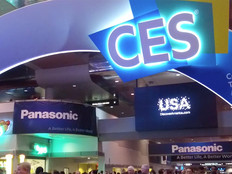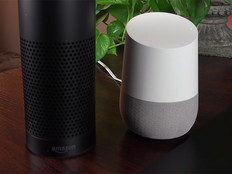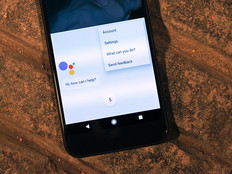CES 2018: AI Assistants, New Displays Make a Big Splash
The CES 2018 conference kicked off this week (and runs through Jan. 12) in Las Vegas and some clear themes are emerging so far from the annual technology conference that could have large implications for businesses.
Although the tech that vendors roll out at CES is largely aimed at the consumer market, businesses will no doubt buy and integrate the new innovations as well, especially as the consumerization of IT continues.
Artificial intelligence assistants such as Google Assistant and Amazon’s Alexa will be integrated into a growing array of devices, some of which will find their way into offices, such as new PCs. Additionally, display makers unveiled large, high-tech displays that businesses may soon use for digital signage or as collaboration tools.
As the week goes on there will likely be other technologies that make waves, including 5G wireless networks, virtual and augmented reality and new PCs with truly day-long battery life.
Here are some of the early themes of CES 2018:
SIGN UP: Get more news from the BizTech newsletter in your inbox every two weeks!
Google Assistant, Amazon Alexa Get into More Gadgets
A key theme emerging this year is the rising number of devices that integrate Google’s Assistant or Amazon’s Alexa — or both. At CES 2017, Alexa took the lion’s share of attention. That’s changing this year as Google rolls out new partnerships.
Google announced in a blog post last week that its Assistant is available on more than 400 million devices (many of which are smartphones) and that it had sold more than one Google Home device every second since Google Home Mini started shipping in October 2017. As The Verge points out, that means, from Oct. 19 through Jan. 4, Google sold at least 6.73 million smart speakers featuring its Assistant.
Such AI assistants will become prevalent in consumer electronics of all kinds in 2018 and beyond. Gartner predicts that by 2020, 60 percent of personal technology device vendors will use third-party AI cloud services to enhance functionality and services. Technology research firm Canalys expects 56.3 million smart speakers to ship worldwide in 2018, up from about 34 million in 2017.
“Emotion AI systems and affective computing are allowing everyday objects to detect, analyze, process and respond to people's emotional states and moods to provide better context and a more personalized experience,” Roberta Cozza, research director at Gartner, says in a statement. “To remain relevant, technology vendors must integrate AI into every aspect of their devices, or face marginalization.”
At CES, tech vendors of all stripes are integrating Google’s Assistant into their gadgets. These integrations (so far) include LG’s ThinQ speakers, its latest 4K OLED and Super UHD LCD TVs, Hisense’s 2018 TV models, lock maker Schlage’s Sense Smart Deadbolt door lock, a smart light switch from GE and even automotive infotainment systems from Panasonic. Google also announced Jan. 8 that it is partnering with Sony, Samsung-owned JBL, LG and Lenovo on Assistant-infused speakers with touchscreen displays in a new platform called Smart Display, CNET reports.
Amazon’s Alexa is no slouch, though. In late November, Amazon announced Alexa for Business, an initiative aimed at bringing its voice-based, Alexa artificial intelligence platform, via its Echo speakers, into office settings.
Alexa will likely be on office desks around the world thanks to partnerships Amazon is striking with PC makers. Alexa will soon show up on Windows PCs, creating new competition for Microsoft’s Cortana voice assistant, which comes standard with Windows 10, Geekwire reports. Hardware makers HP, ASUS, Acer and others plan to bring Alexa to their computers this year, the publication adds (The Verge says Lenovo is also on board). “This is a big step toward making Alexa available wherever customers might need her,” Steve Rabuchin, vice president, Amazon Alexa, says in an Acer statement. All of that could lead to marginalization of Cortana, ZDNet reports.
LG, Samsung Roll Out Flashy Displays
Another theme of CES 2018 is the rollout of large, high-tech displays, which were announced before the official start of the conference on Jan. 9.
In addition to the aforementioned LG TVs with Alexa and Google Assistant integration, LG introduced a new 65-inch “rollable” OLED prototype, which features 4K resolution and can literally be rolled up like a newspaper, The Verge reports.
Samsung also showed off The Wall, an enormous 4K display that measures 146 inches. Samsung describes it as “module-based,” meaning it can be reconfigured in size. It’s unclear how that might work, but the company says, “the modular screen can be used to create a wall-sized display, or simply let consumers increase their traditional screen size to suit a new room in the home.”
In theory, businesses can use these new displays for flexible digital signage to attract or deliver messages to customers, either in the front of stores or in waiting rooms.
Samsung also used CES to unveil the Flip, 55-inch digital whiteboard that can be flipped between portrait and horizontal orientations, according to The Verge. The gadget is meant for meeting rooms and seems designed to compete with devices such as the Microsoft Surface Hub or Cisco Systems’ Spark Board.
Be sure to visit BizTech throughout the week for more coverage of CES 2018.








